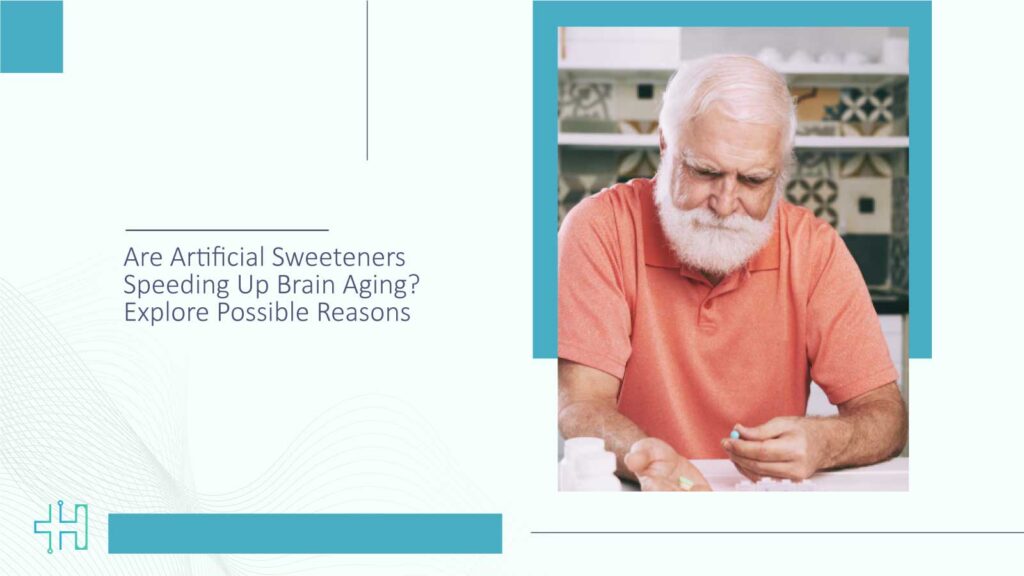It might feel like a smart swap: choosing diet soda or a zero‑calorie snack to avoid sugar. But what if artificial sweeteners speeding up brain aging is a genuine concern? A recent large‑scale study suggests there may be more to the story.
The new evidence in context
A landmark observational study of 12,772 Brazilian adults (average age 52) over eight years found that high consumption of low‑ and no‑calorie sweeteners was linked to a 62% faster cognitive decline, equivalent to about 1.6 years of additional brain aging compared with low consumers.
The group with moderate consumption had a 35% faster decline (1.3 years extra) vs the lowest intake group. Interestingly, the effect was more prominent for participants under the age of 60 and for those with diabetes.
The sweeteners studied included commonly used compounds such as aspartame, saccharin, acesulfame‑K, erythritol, xylitol, and sorbitol; only tagatose showed no clear link. In a separate long‑term cohort, higher intake of artificially‑sweetened beverages correlated with increased risks of stroke and dementia over 10 years.
For professionals in healthtech and innovation, these findings raise important questions: Should digital health solutions adjust recommendations? Are brain‑health monitoring tools missing a new risk vector? What does this mean for preventive strategies?
Why might artificial sweeteners speeding up brain aging make sense biologically?
Gut‑brain axis and microbiome shifts
Emerging research suggests artificial sweeteners can alter gut microbiota, leading to glucose intolerance, systemic inflammation, and possibly neuroinflammation. Altered microbial profiles may translate into changes in brain health over time.
Ultra‑processed foods as a proxy
High artificial sweetener intake often signals higher consumption of ultra‑processed foods, an independent risk factor for cognitive decline.
From a health‑tech lens, this suggests data‑driven nutritional profiling might help flag at‑risk populations earlier.
Direct brain effects and age window
Researchers saw the strongest links in adults under 60, a critical window for setting brain‑health trajectories. In this phase, lifestyle and dietary exposures may have an outsized impact. For tech adoption, this underlines why mid‑life interventions matter.
Implications for healthtech, professionals, and decision‑makers
For health‑technology leaders: Consider how wearable or digital health platforms might integrate sweetener intake, ultra‑processed food tracking, or cognitive‑health dashboards. This adds a new layer to precision prevention and lifestyle monitoring.
For innovation teams: The finding that artificial sweeteners speed up brain aging highlights an evolving risk that may generate demand for new consumer tools, apps for brain‑health tracking, nutritional analytics, or AI‑driven insights in corporate wellness.
For busy professionals and the general public: The message is one of moderation and awareness. Just opting for “diet” or “zero‑calorie” doesn’t guarantee brain‑friendly nutrition. Leaning into real‑food choices, less processed options, and mindful consumption may offer better brain longevity.
Practical steps and strategic thinking
- Audit your sweetener use: Are you frequently using products with aspartame, saccharin, or acesulfame‑K? Reducing intake could reduce exposure.
- Monitor ultra‑processed food consumption: Use nutrition apps or collaborate with wellness platforms to analyse diet quality, not just caloric count.
- Strategic prevention at mid‑life: If you’re in the healthtech domain, consider building or deploying solutions that target the 40‑to‑60 age group, where the study found the biggest associations.
- Educate stakeholders: For CIOs, CISOs, and healthcare decision‑makers evaluating digital health innovations, this is a talking point: lifestyle factors we thought benign may be more meaningful than assumed.
- Stay critical about causation: The study is observational; it shows correlation, not proof. So tools and strategies should reflect nuance and support further data collection.
Limitations and cautionary notes
While the link between artificial sweeteners and speeding up brain aging is compelling, we must remember that the design is observational; it does not prove causation. Self‑reported diet data are subject to recall bias.
For healthtech strategists, this means designing systems that gather richer longitudinal data, integrate imaging or cognitive testing where possible, and iterate with caution.
Conclusion
The notion of artificial sweeteners speeding up brain aging is no longer fringe; it’s backed by substantial observational data and resonates with broader trends in brain health and preventative medicine.
For healthtech professionals, this insight offers both a challenge and an opportunity to transform how we monitor nutrition, cognitive resilience, and mid‑life risk management. For you as a busy professional or decision‑maker, it’s a moment to pause and ask: “Is my sweetener trade‑off really neutral for the brain?”
The smarter path may not be simply swapping sugar for sweeteners, but elevating the whole dietary ecosystem and harnessing technology to clear the way for healthier cognitive futures.
FAQs
- Are artificial sweeteners definitely causing faster brain aging?
Current research shows a strong association between high intake of certain artificial sweeteners and faster cognitive decline. Causation has not been proven because the studies are observational. - Which sweeteners were involved in the studies showing brain‑ageing risk?
The key ones studied include aspartame, saccharin, acesulfame‑K, erythritol, xylitol, and sorbitol, each linked to cognitive decline in the study cohort. Tagatose did not show the same link. - Does this apply more to older adults or younger ones?
The strongest associations were seen among participants under age 60, which suggests mid‑life dietary habits may be particularly meaningful for future brain health. - How should healthtech leaders respond to this finding?
They should consider including sweetener intake and ultra‑processed food tracking in wellness platforms, integrating cognitive health metrics into digital tools, and building interventions targeted at mid‑life users. - If I currently use artificial sweeteners, what practical steps can I take?
Start by reducing reliance on artificial sweeteners, focus on whole‑food alternatives (e.g., fruit, minimal processing), track diet quality (not just calories), and consider cognitive‑friendly habits like sleep, exercise, and mental engagement.
Dive deeper into the future of healthcare.
Keep reading on Health Technology Insights.
To participate in our interviews, please write to our HealthTech Media Room at sudipto@intentamplify.com








